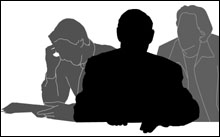
OUT OF THE SHADOWS: Once toiling in thankless obscurity, the news ombudsman is beginning to play a bigger role in American journalism. |
Eleven years ago, after working only a few months as the Boston Globe ombudsman, I attended my First news ombudsmen convention in Fort Worth, Texas. While I was still relatively bright-eyed and bushy-tailed, I did notice that several of my colleagues who had spent years in ombudsmanship had something of a worn, world-weary look about them.One of them pulled me aside, and, noticing my rookie enthusiasm for the job, asked if I thought that the Globe readers who were contacting my office to comment/complain about the paper generally seemed to be full of good-old grassroots wisdom and common sense. When I answered in the affirmative, he shook his head sadly and warned me that in a year, I’d be slamming the phone down and cursing said callers.
There was a certainty in his voice.
Part internal-affairs cop, part complaint department, American news ombudsmen are truly a unique breed. They work in what has often been considered one of journalism’s most thankless jobs: getting an earful from angry (and sometimes crazed) readers and getting the cold shoulder from angry (and sometimes crazed) colleagues whom they dared to criticize, usually gently, in their columns. In addition, ombudsmen frequently toil in the shadow of public suspicion since they are paid by the same news outlets they are charged with independently evaluating.
For the record, I was the Globe ombudsman for a little more than two years, from 1995 to 1997. It’s fair to say that being an ombudsman or public editor or readers’ representative is not for everyone.
In his new book, Public Editor #1, Dan Okrent recounts his career as the first ombudsman (or, as they call it, “public editor”) at the New York Times. His introductory chapter is titled “Notes On An Unendearing Profession” in which he recounts a telling anecdote about his introductory meeting with Times publisher Arthur Sulzberger Jr.
What was the first question Sulzberger asked of the first person to be paid solely to publicly evaluate the paper’s performance?
“Why on earth would you want to do this?”
Last month, after a little less than a year on the job, Globe ombudsman Richard Chacón — a good guy who saw the job as a chance to create better dialogue between the paper’s journalists and its readers — abruptly left the post to become communications director for Democratic gubernatorial candidate Deval Patrick, a gig that might not last past primary day. Although he didn’t say so, it’s fair to assume that Chacón was less than enthralled by some of the less pleasant chores of the ombudsman’s office.
Even the acronym for the umbrella group — the Organization of News Ombudsmen — is the rather lamentable “ONO,” which, let’s face it, is an exclamation usually uttered when someone acknowledges a terrible mistake (or a noun referring to the destructive force behind the break-up of the world’s greatest band).
But despite all that, we’re beginning to see — if not quite a golden age — at least a flowering of the ombudsmanship movement. In this post–Jayson Blair era, when news outlets are recognizing the greater need for transparency, the ranks of ombudsmen are expanding both nationally and globally. The big psychological breakthrough came when the Times, which had fiercely resisted the concept for years, finally agreed to hire Okrent for the job, in the wake of the Blair fiasco in 2003. Recently, such television outlets as CBS and PBS have either hired ombudsmen or begun employing more ombudsman-ly practices.
Equally important, ombudsmen are generating more attention within their own industry. Recently, the new Times public editor Byron Calame and the Washington Post ombudsman Deborah Howell have been the focal point of significant controversies or criticism — a phenomenon that is actually a healthy sign in a business that thrives on feuds and furor.
And in one more positive development, Jim Romenesko — proprietor of the most obsessively read Web site in the media universe — began posting Monday roundups of ombudsmen columns a few years ago, giving them considerably greater visibility.
In an e-mail to the Phoenix, Romenesko acknowledged that “I’m interested in what readers are complaining about (or praising), and the various ethical issues addressed by ombuds.”
But he added: “After years of reading these columns, I say to myself: ‘Thank God I don’t have that job! Hundreds of people calling to gripe about Mark Trail being cancelled? I couldn’t deal with it!’”
Slowly swelling ranks
According to material posted on the ONO Web site courtesy of former ombudsman Arthur Nauman, the US ombudsman movement really gathered steam with the growth of the “anti-press mood” in the 1960s. Noted journalist Ben Bagdikian wrote a 1967 piece in Esquire suggesting that ombudsmen might help papers better communicate with their readers, and Times staffer A.H. Raskin authored a piece in his paper calling for a “Department of Internal Criticism.”